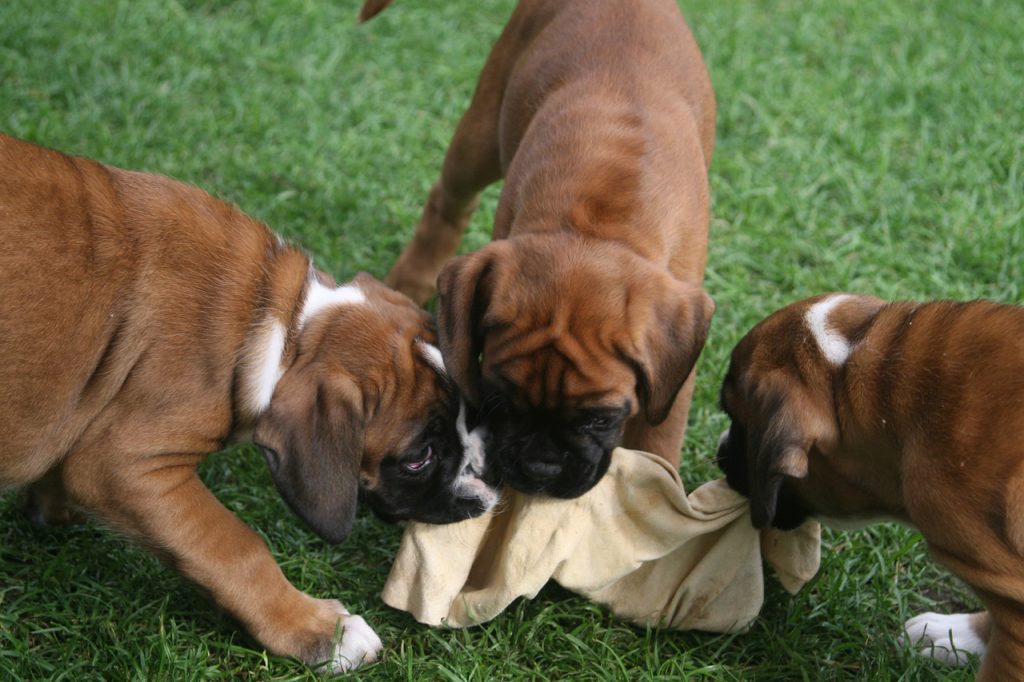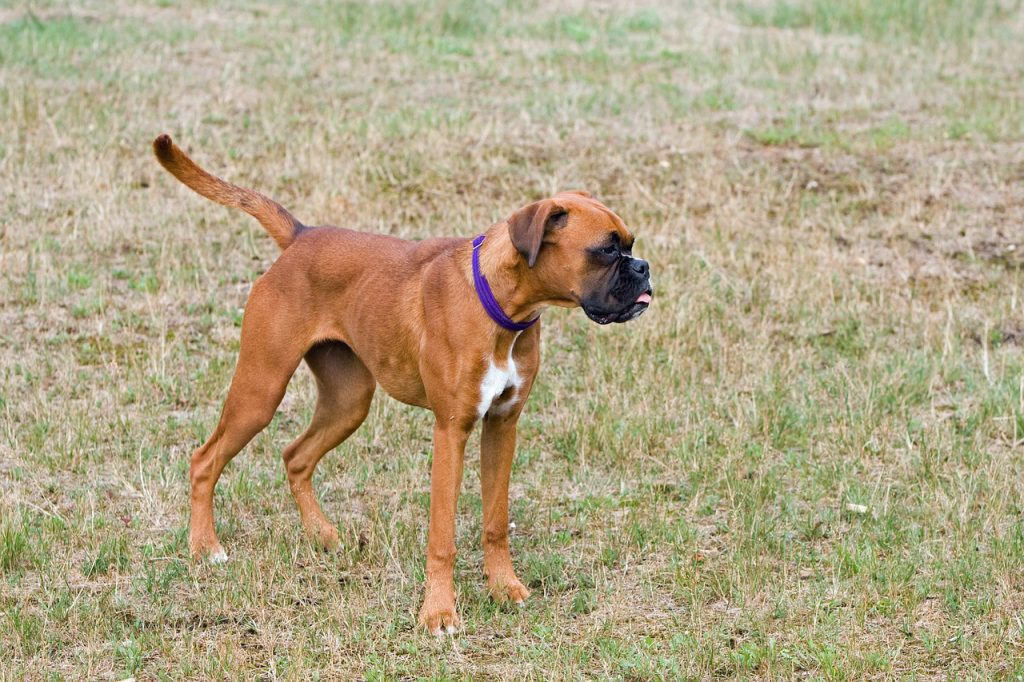
How much food to feed a boxer puppy
For decades the Boxer dogs have been loved and cherished all over the world. Their imposing build along with their gentle and playful personalities captured the hearts of many dog lovers. This broad and muscular breed burns a massive amount of energy in their day-to-day life course, and thereby their diet and feeding formulas are subject to additional requirements. So the food to feed a boxer puppy must be taken in to consideration.
To provide the boxer with quality and meaningful life, it is rather important to know how much food they should be fed, what and how often they should be fed.
Concerns when feeding a Boxer puppy
Boxers are a medium to large dog breed of German descent. Bred to bait bulls in the 19th century, they were fed a lot healthier than they are today, and their dietary habits were managed better. They are, by nature, lovely and enthusiastic, not to mention, far more involved when they are puppies.
Their dietary requirements are a little different from other dog races due to certain anatomical variations. Besides, which, today’s dog food formulations appear to often include several additives and fillers, which can be dangerous for your Boxer puppy. But it is really important to ask “how much should we feed a boxer puppy,” to make sure that your pup receives the nutrition it needs to live a happy, safe life, considering the improvements in feeding formulas that are currently available.
What food to Feed a Boxer Puppy
Although it is undoubtedly not a fact that boxers are picky eaters, they may have special nutrition requirements when it comes to their feeding. Puppies typically need a nutritious feeding formula with a minimum of 22.5% protein (based on the dry matter).
Also, calcium and phosphorus are needed to maximize bone growth for your boxing puppy with ratios of at least 1:1 or even 2:1. However, more is not always better.
If your puppy has too much calcium and “bone-building blocks,” it can grow so rapidly that it cannot support the growing joints. This will keep your Boxer pup from developing joint problems like osteochondritis or hip dysplasia.
- Many Boxers have what their owners call “sensitive stomachs.”
- They could respond to certain foods with irritable bowel syndrome, intestinal cramps, or flatulence (or to rapid changes in their feeding schedules and formulas).
- Boxers are also vulnerable to food-related allergies that can occur as food intolerances such as itching and inflammation. So choosing the right feed for your Boxer Pup might necessitate some experimentation.

How Much Should a Boxer Puppy Eat?
The amount of food your puppy needs, as with any other puppies, depends on his/her activity level, age, and weight. And indefinitely the feeding rate varies with the growth of your boxer.
Boxer puppies, however, demand about 55 calories of food per pound of body weight, from a general viewpoint.
A Boxer puppy is likely to become a medium to large muscle and a lean dog between 50 and 70 pounds if it feeds the correct food type and amounts. Since they are a highly active muscle species, they need high-quality protein foods to feed their energy slightly more than other less active breeds.
For this reason, it is advisable to feed your boxer with food containing around 30% protein, particularly during the development process. Many dog food brands have just 25 percent protein formulas, which could prove to be inadequate for a Boxer puppy. It is therefore critical that you do your research and invests in a feeding formula of good quality.
There is a common misconception that Boxer puppies should be fed twice as much food as they can consume as adults. It is still a good idea, however, to weigh your puppy every week or every two weeks and change the food intake accordingly. Some puppies may be susceptible to elevated protein, in which case food with moderate protein and fat content is recommended. Besides, Boxers will require a Calcium-to-Phosphorous ratio as near as possible to 1:1.
In the first 6 to 8 months, your puppy can develop steadily in size and maturity. That’s why it would be a good idea to measure your pup every so often and select the optimum quantity of food. When your puppy grows older, you should decrease food consumption progressively as it can go longer without food.
Kibble specifically intended for Boxer puppies is what is widely recommended as a choice of food as it helps preserve both intestinal and oral health and is nutritious. Some Boxer puppies tend to be a bit sensitive to food, in which case you may have to try a few options before you settle on your favorite puppy.
Food with Omega-6 fatty acids is great for a sparkling coat and to support skin health. Omega-3 fatty acids are perfect to see on an ingredient panel to control inflammatory or arthritis pain in older Boxer dogs and aid with heart, kidney, and overall mood stabilization like Cosequin, you can only feed Omegas separately, and if you do want to, squeeze a gel capsule over your Boxers’ meal.
How Often Should You Feed a Boxer Puppy?
During their development, Boxer puppies need the recommended quantities of high-quality food and feeding formulas in different ranges.
- They can be fed up to 4 times a day between 2 and 4 months.
- Individual pups can still be eaten 3 times daily between 4 and 6 months.
- The frequency is reduced 2 to 3 times daily over 6 months.
- The frequency is reduced 2 to 3 times daily over 6 months. It is also possible to maintain this level of food in adulthood. (This is the stage where you can teach your pup some food or sleep or exercise discipline and whatnot.)
- Certain boxers tend to have a “skinny phase” for 1 to 2 years, which might take time to complete. In these cases, three meals a day can be considered. However, 2 meals per day are the preferred feeding schedule for your dog to train.
- It’s also not recommended to cut down to one meal a day because boxers are particularly vulnerable to constipation problems.
How to know if you’re Feeding your Boxer Too Much ?
You might check on your Boxer puppy, just like regular puppies, simply to see if it’s overfed or underfed. You can feel some pressure from its ribcage or spine as you place your hands on the chest or back of your puppy. If you can’t feel the bones, which means you are feeding your puppy too much.
And you can encounter several problems by over-feeding your puppy.
Bloating
Bloating is a problem that is particularly common among boxer puppies. It can happen if you feed your puppy too much or too little. Constant bloating may contribute to other more severe gastrointestinal problems that could prove fatal to your dog. For this reason, boxer puppies are often recommended eating kibble-free foods and raw diets as they use more plant-based protein and carbohydrate formulas.
Other food sources containing items such as grain, wheat, rice, and oats are frequently discouraged and may trigger excess gas in boxer puppies, which in turn causes bloating problems.
Obesity
As previously described, boxers are ideally supposed to have a slim, muscular build. They are not specifically susceptible to gaining too much weight, which is why the level of carbohydrates and fats in their food formulations is less of concern.
However, boxer puppies or any dog are considered to be opportunistic when it comes to feeding. They don’t know or care if they’re starving or need food. They will also continue to eat as long as they have food at their mercy. That’s why it’s never suggested to leave food for your pets because there’s a fair chance they’ll eat it all in one go.
Other causes can also be a reason for puppies to overeat, including hormone complications such as hypothyroidism and Cushing’s disease.
Boxer puppies may end up overeating for these reasons, which could cause them to become obese and overweight. This, in essence, will make their joints weak and cause arthritis, heart disease, liver disease, and kidney problems.
How to know if you’re Not Feeding Them Enough?
You can use the same method to ensure that your puppy doesn’t eat enough. If you can feel too many of his bones without too much pressure or if the ribcage is noticeable, there’s a fair risk that you do not feed him enough.
There may be a variety of reasons why your puppy does not eat enough. Very frequently, loss of appetite is also one of the first symptoms of a more severe illness.
But apart from that, dogs’ parents might end up undernourishing their dogs because they become too obsessed about their weight.
This can also occur due to various reasons, such as;
Anorexia
Anorexia is indeed a problem for dogs, just as it is for human beings. Symptoms of anorexia include fever, pain, shortness of breath, and tiredness. In certain cases, it can also induce changes in the size of the organ and the weak lungs. If left untreated, it can end up being fatal to your dog.
Lack of exercise may also be a source of anorexia, which is why exercise has become so crucial to your puppy. They will likely burn calories at the same amount of consumption to maintain balance.
Short Life Span
If you consistently underfed your Boxer puppy during its stage of growth, it will most likely grow into an undernourished and extremely unhealthy boxer, with far less engagement and energy than most other boxers. This could also affect his life span. Since Boxers are muscular dogs with a reasonable level of activity, they do need a constant supply of nutrients as described above, otherwise, they will not accompany you for a long time.
Recap
Boxer puppies need great care and consideration when it comes to their diet since they have some particular and unique dietary needs compared to other dogs with the same level of activity. However, once you’ve settled into a routine where you’ve fixed a certain brand or type of food that meets all the nutritional value criteria, as well as your dog’s personal preferences, and you’ve formed a disciplined schedule of feeding times, raising a Boxer puppy is going to be the funniest job you’ve ever had.
Your puppy will quickly grow into the most loyal, polite, affectionate, and enthusiastic boxer you’ve always wanted him to be.

What to Avoid when feeding your Boxer Puppy?
Many brands seem to be able to recognize at least one of these ingredients that you’d never want in your Boxer’s food.
- There are no grains at all. Until ultimate research has been completed, play it safe and offer kibble with some level of healthy grain unless otherwise recommended by the veterinarian (Boxer Pup must be on a specific grain-free diet, etc.)
- Another one is synthetic preservatives, which could certainly be toxic. Butylated Hydroxyanisole (BHA), Hydroxytoluene (BHT) Butylated, and Ethoxyquin are just a few more that are linked to behavioral issues, organ failure, and certain types of cancers.
- Artificial Coloring Ingredients, Blue 02, Yellow 05, and 06 are the most common types of dyes that we can find in feeding formulas that cause behavioral problems in puppies.
- Additional taste enhancers like MSG, which is one of the worst taste enhancers, are linked to anxiety, stress, rapid heartbeat, and respiratory problems.
- Fillers are inexpensive additives that are mixed into dog food to pump it up but have little or no nutrient properties. The ‘food’ goes directly through their digestive system. A dog could eat a massive amount of food and yet still be hungry again shortly after. Because of that fast metabolism function, this has become one of the major causes of Coprophagies (eating feces).
- By-products — There are animal parts such as some intestines that are not suitable even for a boxer. Consumption and feeding formulas that involve such food might cause troubles with spinal tissue, lung failure, spleen removal, issues in hooves and tails and undeveloped ovum, etc.